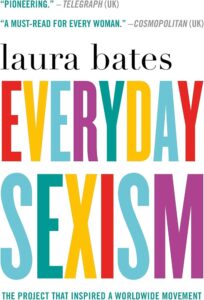Equimundo’s work focuses on the life cycle of men, providing individuals, families, organizations, and institutions with the tools they need to ensure that men and boys are happy, healthy, and caring – for themselves and the women and girls in their lives. To do this, we collaborate with experts on boyhood, feminism, masculinities, and intersecting topics to produce high quality research, programming, and advocacy. These experts make up our board, our fellows, and our staff. Below, we’ve compiled a list of books by “Equimundians” – the people whose knowledge of these topics helps to make our work possible.
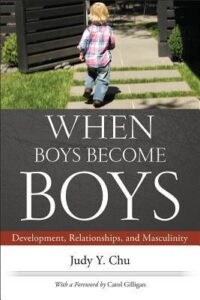
When Boys Become Boys: Development, Relationships, and Masculinity
by Judy Y. Chu and Carol Gilligan
When Judy Y. Chu first encountered the four-year-old boys we meet in this book, they were experiencing a social initiation into boyhood. They were initially astute in picking up on other people’s emotions, emotionally present in their relationships, and competent in their navigation of the human social world. However, the boys gradually appeared less perceptive, articulate, and responsive, and became more guarded and subdued in their relationships as they learned to prove that they are boys primarily by showing that they are not girls.
Based on a two-year study of boys aged four to six, When Boys Become Boys offers a new way of thinking about boys’ development. Chu finds that behaviors typically viewed as “natural” for boys reflect an adaptation to cultures that require boys to be emotionally stoic, competitive, and aggressive if they are to be accepted as “real boys.” Yet even as boys begin to reap the social benefits of aligning with norms of masculine behavior, they pay a psychological and relational price for hiding parts of their authentic selves.
Through documenting boys’ perceptions of the obstacles they face and the pressures they feel to conform, and showing that their compliance with norms of masculine behavior is neither automatic nor inevitable, this accessible and engaging book provides insight into ways in which adults can foster boys’ healthy resistance and help them to access a broader range of options for expressing themselves.
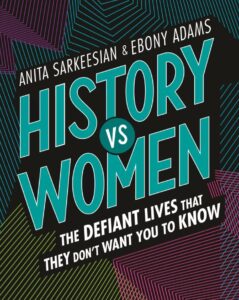
History vs Women: The Defiant Lives that They Don’t Want You to Know
by Anita Sarkeesian
Rebels, rulers, scientists, artists, warriors and villains: Women are, and have always been, all these things and more. Looking through the ages and across the globe, Anita Sarkeesian, founder of Feminist Frequency, along with Ebony Adams PHD, have reclaimed the stories of twenty-five remarkable women who dared to defy history and change the world around them. From Mongolian princesses to Chinese pirates, Native American ballerinas to Egyptian scientists, Japanese novelists to British Prime Ministers, History vs Women will reframe the history that you thought you knew.
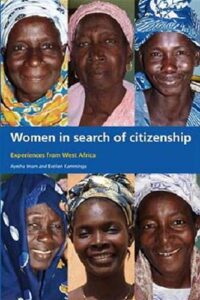
Women In Search of Citizenship: Experiences from West Africa
by Ayesha Imam
This book provides insights into what gender inclusive citizenship means as a practice and what can be achieved when it is promoted. It shares the experiences of women in local communities devising ways to exercise their citizenship. It is about women working on rights and thereby furthering their understanding of citizenship, beginning to speak for themselves and to make claims. It is about women developing their own agency and acting for themselves. And it is about women investigating and addressing institutional barriers in order to ensure their rights have concrete effects in their daily lives.
These experiences arose out of an innovative regional program that supported seven women’s rights and human rights organizations in Senegal, Mali, Burkina Faso and Niger. It was initiated because of the recognition by Oxfam Novib and KIT that despite many development efforts to mainstream gender, provide gender training and strengthen women’s leadership, women in many parts of the world are still not fully recognized as citizens with rights. These experiences demonstrate ways in which women can change that.
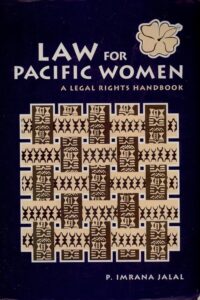
Law for Pacific Women: A Legal Rights Handbook
by Imrana Jalal
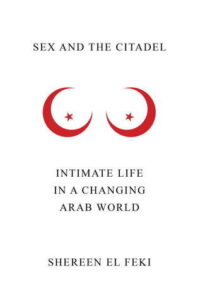 Sex and the Citadel: Intimate Life in a Changing Arab World
Sex and the Citadel: Intimate Life in a Changing Arab World
by Shereen El Feki
As political change sweeps the streets and squares, the parliaments and presidential palaces of the Arab world, Shereen El Feki has been looking at an upheaval a little closer to home—in the sexual lives of men and women in Egypt and across the region. Sex is entwined in religion, tradition, politics, economics, and culture, so it is the perfect lens through which to examine the complex social landscape of the Arab world. From pregnant virgins to desperate housewives, from fearless activists to religious firebrands, from sex work to same-sex relations, Sex and the Citadel takes a fresh look at the sexual history of the region and brings new voices to the debate over its future.
Everyday Sexism
by Laura Bates
In 2012 after being sexually harassed on London public transport Laura Bates, a young journalist, started a project called Everyday Sexism to collect stories for a piece she was writing on the issue. Astounded by the response she received and the wide range of stories that came pouring in from all over the world, she quickly realised that the situation was far worse than she’d initially thought. Enough was enough. From being leered at and wolf-whistled on the street, to aggravation in the work place and serious sexual assault, it was clear that sexism had been normalised. Bates decided it was time for change.
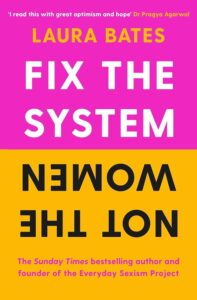
Fix the System, Not the Women
by Laura Bates
Too often, we blame women. For walking home alone at night. For not demanding a seat at the table. For not overcoming the odds that are stacked against them.
This distracts us from the real problem: the failings and biases of a society that was not built for women. In this explosive book, feminist writer and activist Laura Bates exposes the systemic prejudice at the heart of five of our key institutions: education, politics, media, policing, and criminal justice. Combining stories with shocking evidence, Fix the System, Not the Women is a blazing examination of sexual injustice and a rallying cry for reform.
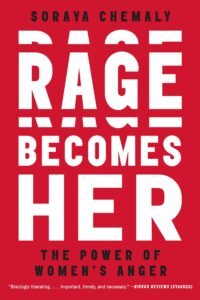
Rage Becomes Her
Women are angry, and it isn’t hard to figure out why. We are underpaid and overworked. Too sensitive, or not sensitive enough. Too dowdy or too made-up. Too big or too thin. Sluts or prudes. We are harassed, told we are asking for it, and asked if it would kill us to smile. Yes, yes it would. Rage Becomes Her makes the case that anger is not what gets in our way, it is our way, sparking a new understanding of one of our core emotions that will give women a liberating sense of why their anger matters and connect them to an entire universe of women no longer interested in making nice at all costs.
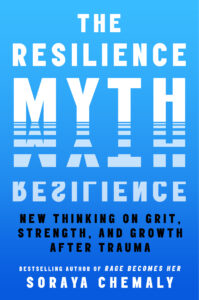
The Resilience Myth
We are often urged to rely only on ourselves for strength, mental fortitude, and positivity. But with her distinctive “skill, wit, and sharp insight” (Laura Bates, author of Girl Up), Soraya Chemaly challenges us to adapt our thinking about how we survive in a world of sustained, overlapping crises.
It is interdependence and nurturing relationships that truly sustain us, she argues. Based on comprehensive research and eye-opening examples from real-life, The Resilience Myth offers alternative visions of relational hardiness by emphasizing care for others and our environments above all.
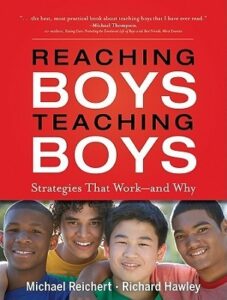
Reaching Boys, Teaching Boys: Lessons About What Works – and Why
by Michael Reichert
Based on an extensive worldwide study, this book reveals what gets boys excited about learning Reaching Boys, Teaching Boys challenges the widely-held cultural impression that boys are stubbornly resistant to schooling while providing concrete examples of pedagogy and instructional style that have been proven effective in a variety of school settings. This book offers more than 100 detailed examples of lessons that succeed with male students, grouped thematically. Such themes include: Gaming, Motor Activities, Open Inquiry, Competition, Interactive Technology, and Performance/Role Play. Woven throughout the book is moving testimony from boys that both validates the success of the lessons and adds a human dimension to their impact.

I Can Learn From You: Boys as Relational Learners, How to Raise a Boy: The Power of Connection to Build Good Men
by Michael Reichert
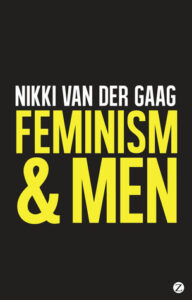
Feminism and Men
by Nikki van der Gaag
Feminism has changed the world; it is radically reshaping women’s lives. But what about men? They still hold most of the power in the economy, in government, in religions, in the media and often in the family too. At the same time, many men are questioning traditional views about what it means to be a man. Others resent the gains women have made and want to turn back the clock.
Nikki van der Gaag asks the how might feminism improve the lives of men as well as women? And is there a place for men in the feminist story?
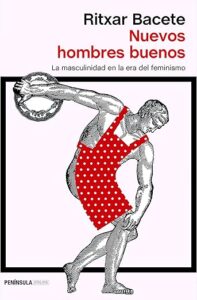 Nuevos hombres buenos: La masculinidad en la era del feminismo (ATALAYA) (Spanish Edition)
Nuevos hombres buenos: La masculinidad en la era del feminismo (ATALAYA) (Spanish Edition)
by Rixtar Bacete González
El feminismo ha revolucionado y redefinido, en el último siglo, el papel de las mujeres en la sociedad, en un proceso que ha supuesto, inevitablemente, cuestionar y transformar el rol de lo masculino. Y pese a que cada vez más hombres apoyan —al menos desde la teoría— ese proceso de acercamiento a la igualdad, una de sus consecuencias es que ha dejado a la mitad de la humanidad huérfana de un modelo de referencia: el viejo ya no sirve para la convivencia equitativa con las mujeres en una sociedad democrática y el nuevo está aún en construcción.
¿Qué significa ser hombre hoy en día? Sin duda, mucho más que tener un pene. Ser hombre, igual que ser mujer, es un modo aprendido de estar en el mundo, de vestir, de caminar, de sentir y de cuidar. La masculinidad trasciende así el hecho biológico y adquiere sentido dentro de una construcción cultural. Y, por suerte, las construcciones culturales pueden cambiarse.
Llega, pues, el momento de crear una nueva masculinidad. Y nada mejor para ello que partir de las reflexiones y propuestas de Ritxar Bacete, uno de los mayores especialistas en género y masculinidades de España, que en este libro apuesta por superar el machismo y reconvertir las masculinidades hegemónicas tóxicas y de dominación en modelos de diversidad, justicia, equidad, diálogo y paz.

The Psychology of Black Boys and Adolescents
by Warren Spielberg
Despite examples set by successful black men in all walks of life, the truth remains that a disproportionate number of black boys and young men underperform at school, suffer from PTSD, and, too often, find themselves on a pathway to jail. The two-volume The Psychology of Black Boys and Adolescents marks the first attempt to catalog the many psychological influences that can stack the deck against black male children―and to suggest interventions. Bringing together an expansive collection of new and classic research from a wide variety of disciplines, this set sheds light on the complex circumstances faced by young black men in the United States. Among the myriad issues studied in this set are the often-negative expectations of society, the influence of gangs, and the impact of racism and poverty. Of equal importance, the work explores culturally specific ways to engage families, youths, communities, and policymakers in the development of healthy, safe, educated boys who will become whole and successful adults.
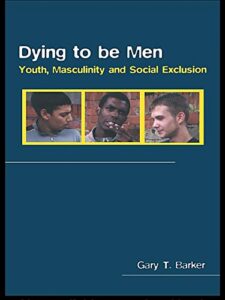
Dying to be Men: Youth, Masculinity and Social Exclusion
by Gary Barker
This book examines the challenges that young men face when trying to grow up in societies where violence is the norm. Dr. Gary Barker, who has worked directly with low-income youth and witnessed first hand the violence he describes, provides a compelling account of the young men’s struggles. He discusses the problems these men face in other areas of their lives, including the difficulty of staying in school, the multiple challenges of coming of age as men in the face of social exclusion, including finding meaningful employment, and their interactions with young women, including sexual behavior and the implications of this for HIV/AIDS prevention.
The book presents examples of evaluated programs that have been able to aid young men in rethinking what it means to be a man and ultimately focuses on ‘voices of resistance’ – young men who find ways to stay out of violence and to show respect and equality in their relationships, even in settings where male violence and rigid attitudes about manhood are prevalent.
Have you read any of these books?



